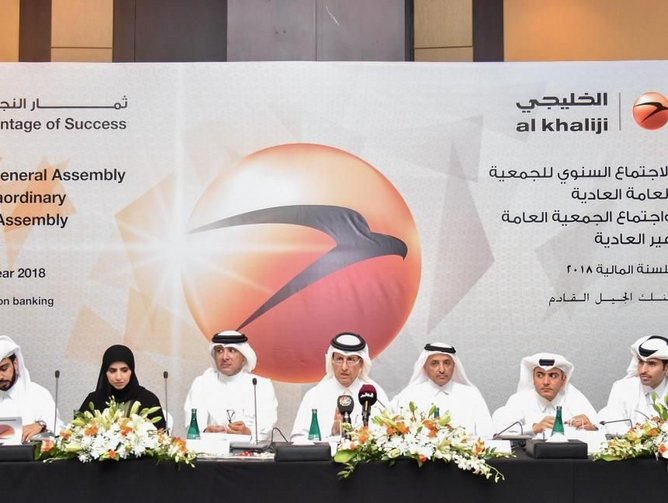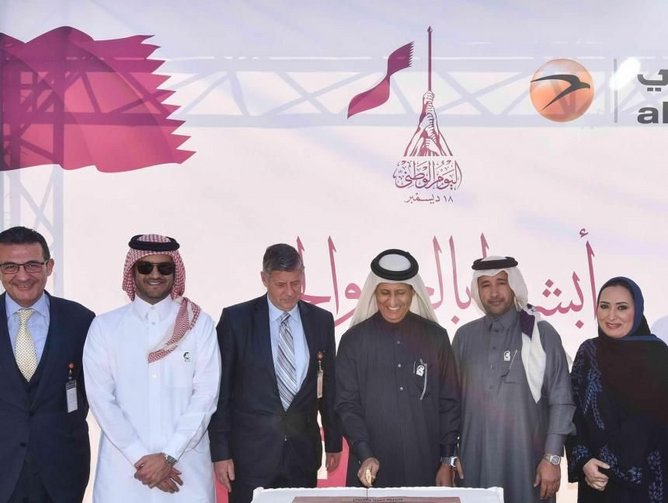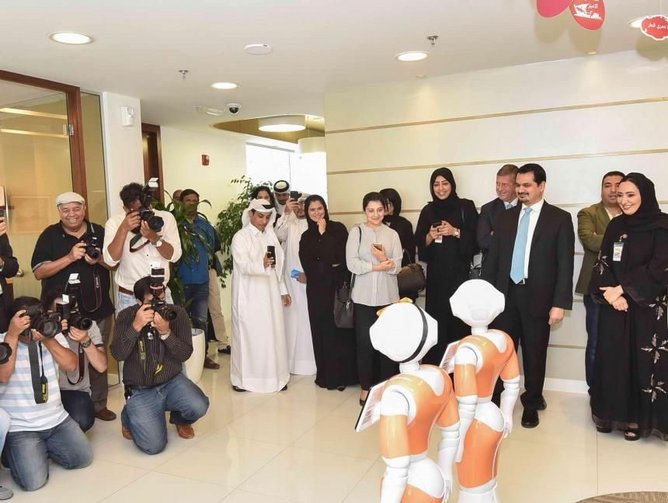Why Al Khaliji is Qatar’s ‘next generation bank’, powered by digital transformation
Al Khaliji Commercial Bank P.Q.S.C is Qatar’s pioneer ‘next generation bank’, offering a full range of conventional banking products and services to Premium, Business, Corporate, and International clients in Qatar and France. Though the bank is little over a decade old, it has amassed awards such as Best Corporate Bank for two years consecutively, Best Private Bank in 2019, and Fastest Growing Bank. Saltuk Benderlioglu was part of the establishment of Al Khaliji when it came into operation in 2008. In 2014, he became Head of Information and Communication Technology. "In my role as Head of IT, it is my responsibility to steer our bank through the uncharted territory of unpredictable technology trends," he explains. "This includes Internet of Things, machine learning, AI, data analytics, blockchain and robot advisers. In this role I need to understand the technological climate to ensure that our bank maintains its competitive edge." He emphasises that, with the growth of technology, the need for information security only increases, adding that Heads of IT have a responsibility to ensure that new and creative solutions are combating cybersecurity challenges.
Benderlioglu says that banks take years to establish, and that the company has adjusted its banking strategy over the years to match changes in climate. It has done this by initiating corresponding technology projects, such as core banking replacement. "Technology is driving the business environment, but when devising our business strategy, technology must always follow the business," says Benderlioglu, emphasising that the most important factor in the company's current transformation plan is agility. "This ensures that we maintain our competitive edge, and keep ahead as the ‘next generation bank’."
BECOMING THE ‘NEXT GENERATION BANK’
"To be the 'next generation bank' is to be a step ahead of where we are in the financial services market in which we operate. This means remaining technologically advanced." Benderlioglu warns, however, of the risk that accompanies this challenge, as technological trends have the potential to lead businesses astray from the market or business model. It is to this end that Al Khaliji proceeds with caution and thorough analytics. "The ‘next generation bank’ is able to make educated, high-quality decisions, on the state of technology in order to remain a leader in financial services," he explains. "The other quality of a ‘next generation bank’ is maintaining appeal to younger generations of customers."
There are many ways in which the bank is technologically transforming to become the ‘next generation bank’. "Al Khaliji is moving towards cloud computing with slow but steady steps,” says Benderlioglu. “Currently, the bank is focusing on hybrid options, which means being able to run services both from the cloud and with services on the premises.” In addition to this, Al Khaliji is building upon its AI capabilities. "AI applies first to our analytics. Our IT strategy divides into two major sections: transactional banking and analytical banking." He notes that AI is particularly relevant to the latter, and that the bank is working on systems to assist with the decision making aspect. This includes aspects of compliance, which has also improved with the implementation of AI. "These areas are where we have our foot in the AI world, and our starting point before we move to offering direct AI solutions to our customers."
Benderlioglu shares that the adoption of these new technologies is not without its challenges. "The trickiest part of data and analytics is that the foundation needs to be right from the beginning in order to have a good analytics framework for your internal decision making." Al Khaliji began its implementation of analytics internally, focusing on regular reporting, management information, decision making systems and compliance. Benderlioglu attributes part of this success to one of the bank's partners, Tyconz, which helped establish the foundations for analytics. "We are now in a position to offer our analytical power to our customers, and we are in the process of preparing to offer this to our corporate clients." This will allow customers to access their own information in the speedy and efficient way that is increasingly demanded by today’s consumer.
One notable innovation from the bank is the creation of humanoid robots, Jassim and Noor. "Our humanoid robots are implemented in our sales strategy. As these humanoids can move on their own, we present them at customer-based events," explains Benderlioglu. When asked of the challenges presented when creating the humanoids, Benderlioglu says that the largest challenge was managing expectations. Benderlioglu is referring to the wide variety of associations that can be had with a robot, from basic automation to the most creative science-fiction inventions. "We have to ensure that the robot is always presented in the context of banking," he elaborates. "This is a customer service designed for the banking population." It is for this reason that the humanoids act as ‘ambassadors’ of the bank, and not a direct sales point. Despite this, they have the potential to act as a ‘lead’ for a member of the sales team, should they interact with a customer with greater requirements.
With the rise of Big Data, AI and analytics, the need for security is greater than ever. "Security of data is always our first priority," asserts Benderlioglu, "and regulation is paramount to a bank that operates in multiple countries, as regulation varies across regions." This is particularly relevant to Al Khaliji, as the bank must take into account compliance with GDPR in its French subsidiary. “To comply with GDPR, we have a separate storage facility for our European operations. When information needs to be exchanged for compliance, we interact with European and, in particular, French regulations." Benderlioglu notes that Al Khaliji's vast knowledge of regulation also offers potential. "By understanding these laws across different countries, it provides us with a better understanding of data and the new ways in which it can be utilised in countries we operate in outside of Europe. This allows us to provide greater security to all of our customers." This knowledge is highly valued by Al Khaliji's customers, as the bank communicates with every demographic of readership through its social media platforms and corporate communications department. "Our customers are demanding,” says Benderlioglu. “They want to know what is happening with their data, and it is our responsibility to reassure them and keep them abreast of our updated security solutions."
CHANGE MANAGEMENT
"We have implemented the art of change management,” says Benderlioglu, reflecting on the transformation thus far. "We have been through a rapid technological shift, and this has required effective communication and education both internally to our staff and externally to customers and regulators." Benderlioglu said that overseeing this process was a challenge, as it is not an easy process, but Al Khaliji has done it exceptionally well. "If you fail to implement change management, you cannot conduct successful, large projects in sequence." Al Khaliji has two offices within the bank that are responsible with coordinating this process: a small, effective IT office, and an overall strategy for projects functionality that reports directly to the CEO. "The CEO office itself has a strategy and project management lead, which works in full coordination with all the stakeholders, but particularly with the project and strategy office in the IT department. This is required of a fast paced bank like us, and this is what makes us the ‘next generation bank’." Should the bank need additional help with implementing a strategy, it chooses to approach specialist consultants. "Boston Consulting Group assisted us and helped us with implementing a new strategy a few years ago," says Benderlioglu.
Digital transformation has caused a significant shift in culture, but Benderlioglu asserts that this has only strengthened Al Khaliji’s relationship with its vendors. "Al Khaliji seeks a long term partnership with its vendors," he says. "We are diligent in finding the right solution for us and our customers. We have our solutions customised for us, and seek to fully understand and build upon each tailored solution. One excellent example is Temenos, a company that is right for Al Khaliji because it consistently develops its solutions with agility." He notes that a long-term key partner is VEDAS, as it supports Al Khaliji in the payments sector. "It can be more of a challenge to engage and maintain new technologies when attention is primarily focused on the day to day running of the bank, but VEDAS brings us the latest innovations and informs us of new technological advancements across the world.”
THE FUTURE OF THE BUSINESS
Qatar is a fast moving economy, and as Al Khaliji looks to the future, its strategy places it in a prime position to remain at the forefront of technological growth across the region. Benderlioglu notes that, as Al Khaliji presses on through its digital transformation, it will be pushed to reconsider regulatory boundaries. He adds that technological advancements move ahead of regulations, and so it is imperative that regular discussions take place with regulators, resulting in a modification or introduction of policy. With the conscientious nature of the bank, and its educated understanding of the movement of the technology market, it certainly will continue to establish itself as the ‘next generation bank.’





